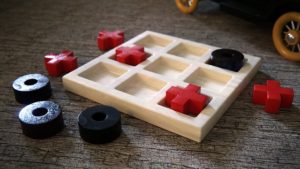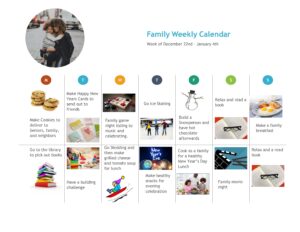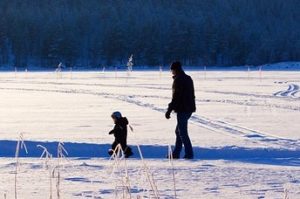 During winter break and everyone is home, what are you going to do every day? No need to panic, we have some ideas to keep everyone busy, productive, learning and practicing healthy habits.
During winter break and everyone is home, what are you going to do every day? No need to panic, we have some ideas to keep everyone busy, productive, learning and practicing healthy habits.
Game or Puzzle Time
- Playing a game or working a puzzle can enhance social connections. Take advantage of opportunities to have meaningful conversations and build a bank of shared memories.
- Working a puzzle or game also involves using and perfecting skills of problem solving, critical thinking, logic and reasoning. Children also learn to follow rules and practice taking turns during game play.
- Reduce stress. This is achieved by taking the time to shift your attention away from daily worries and anxieties while playing a game or solving a puzzle.
Cooking with Kids
- Review the importance of washing hands with soap and water before preparing food.
- Start with simple tasks such as gathering supplies, sorting ingredients, rinsing produce and stirring mixtures.
- Explain and show how to do any new or unfamiliar tasks.
- Read recipe directions out loud and coach children to follow them. Following instructions is an important skill they will use in school and life.
- When measuring ingredients reinforce math skills.
- Plan on there being a mess. Have supplies ready to help children clean up, such as lots of paper towels and a broom.
Create New Family Traditions
Creating new family traditions can be as simple or complex as you and your family wish for them to be. For example, making holiday cards to celebrate the holiday season and sending them to friends and families helps children understand the power of words. This will also teach them to write thank you cards for gifts or special time that they have had with family over the season.
 Other great ideas for new family traditions are:
Other great ideas for new family traditions are:
- Make cookies or snacks that can be shared with friends and family.
- Get outside and being active.
- If you have snow, go sledding, ice skating or even skiing.
- Plan and cook meals together.
- Have a snowman or gingerbread house building contest.
- Make snow ice cream.
Take a Stay-cation
- This is where you sleep in your own bed but make field trips to locations in your area that a tourist would visit.
- Depending on your budget, eat out or bring a picnic type meal to enjoy on your day trips and experiences.
- Take lots of pictures.
Plan a Daily Walk or Hike
 The benefits of getting outdoors include reducing the risk of obesity, asthma, heart disease, diabetes, and stress in children and adults. Just 20 minutes per day (around 2 hours per week) can make a difference. Researchers have found when we connect with nature, it can promote holistic well-being.
The benefits of getting outdoors include reducing the risk of obesity, asthma, heart disease, diabetes, and stress in children and adults. Just 20 minutes per day (around 2 hours per week) can make a difference. Researchers have found when we connect with nature, it can promote holistic well-being.
- Consider starting a nature journal to preserve observations and memories.
- Practice mindfulness in nature: Take time to engage all five senses while outdoors. Notice the sights, sounds, smells, textures, and tastes of the natural environment.
Let Each Family Member Plan One Day or Activity
- If your teenager wants to spend most of the day at the mall, everyone goes to the mall. A friendly scavenger hunt might entertain anyone not actively shopping.
- When your child or grandchild wants to go to the zoo, farm, horse rescue, animal shelter, etc., make it a family trip.
 Parent(s) might want to get the house in order. If so, involve the whole family. Help family find the joy in the small or otherwise mundane activities. For example, clean out the toy bin, garage, closet, or cupboards in order to:
Parent(s) might want to get the house in order. If so, involve the whole family. Help family find the joy in the small or otherwise mundane activities. For example, clean out the toy bin, garage, closet, or cupboards in order to:
- Make room for the newer items you may have received as a gift.
- Shift your mindset and environment to start the new year with new intentions such as:
- Simplifying your life or surroundings.
- Prioritizing items that bring value or joy to your life.
- Getting organized.
- Donating items to worthy organizations such as Goodwill, ARC Thrift, local thrift store, etc.


Thanks for sharing these ideas of what to do and I liked that the calendar included doing things for myself such as reading a book!